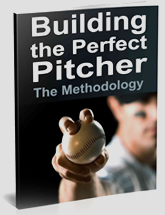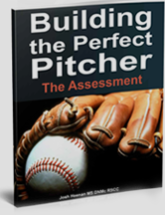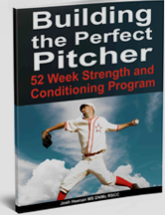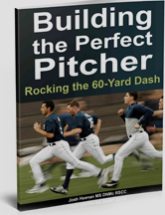Why All Baseball Players Should Be Using Creatine
Creatine is a compound found primarily in muscle cells in the body and in food, especially red meat. Baring any liver or kidney dysfunctions, creatine has been show to be safe to use for adolescences and adults. In fact, there is some research that shows lower levels of LDL and triglyceride for users of the product.1

In numerous studies, the use of creatine has been show to increase lean body mass, decrease short sprint times (power), increase vertical jump (power), and an increase in creatine levels in skeletal muscle.2 During activities with short bursts (~10 seconds) of work, our body utilizes creatine as a source of fuel, giving us more energy readily available.
Pitchers specifically have even more reason to be using this supplement year round. Bodyweight has been directly correlated to fastball velocity, and creatine has been shown to increase bodyweight through both muscle mass and water retention.3 The increased bodyweight allows pitchers to put more force into the ground and transfer more force into the ball.
As a general rule of thumb, our Sacred Heart pitchers will gain 2-4 mph a season during their 4 years in college. As much as I would love to say it’s just training, there are numerous reasons why we get increased ball velocity each year including mechanical improvement, growth of body due to puberty, increased muscle mass, and improved body awareness/muscular coordination. The interesting trend is that most of our athletes tend to add anywhere from 5-15 lbs of bodyweight each year.
_thumb.jpg?max_width=450)
Does 5-15lbs = 2-4mph on the mound? Maybe.
My recommendations for creatine are based on the most studied form— creatine monohydrate. Other forms may be fine, but they have limited research backing them and are outrageously priced. Take 5-10 grams a day ideally post workout with a protein and carbohydrate shake. There is little need to use loading protocols to “saturate” the muscles. Just be consistent with your use.
This post is geared towards baseball players, but in reality, if you are an athlete or have athletes that are looking to move faster, jump higher, and have more energy; this is probably a supplement you would be wise to investigate for yourself.
Feel free to post questions below.
Citations
1. Juhn MS, Tarnopolsky M. Potential side effects of oral creatine supplementation: a critical review. Clinical Journal of Sport Medicine. 1998;8(4):298–304.
2. Ostojic SM, others. Creatine supplementation in young soccer players. International journal of sport nutrition and exercise metabolism. 2004;14(1):95.
3. Werner SL, Suri M, Guido JA Jr, Meister K, Jones DG. Relationships between ball velocity and throwing mechanics in collegiate baseball pitchers. J Shoulder Elbow Surg. 2008;17(6):905–908.











Alex 11:33 pm on September 27, 2012
Is creatine legal in the NCAA?
Josh Heenan 7:59 pm on September 27, 2012
Alex,
Yes it’s 100% legal by the NCAA. It’s also approved by the Olympic committee.
Here is the list of categories for banned substances in the NCAA:
a. Stimulants;
b. Anabolic Agents;
c. Alcohol and Beta Blockers (banned for rifle only);
d. Diuretics and Other Masking Agents;
e. Street Drugs;
f. Peptide Hormones and Analogues;
g. Anti-estrogens;
h. Beta-2 Agonists.
Creatine does not belong in any of those categories as it is a natural substance found in meat just as sugar is found in chocolate.
Here is a link to the NCAA Banned Substance List http://www.ncaa.org/wps/wcm/connect/public/NCAA/Health+and+Safety/Drug+Testing/Resources/NCAA+banned+drugs+list
Dave 11:20 pm on October 2, 2012
Are there any disadvantages to using other forms of creatine other than monohydrate or is it simply because they are less studied?
Josh Heenan 12:20 pm on October 3, 2012
Dave,
My recommendations are based on the research that is available right now. Some forms claim to be better absorbed because they are liquid, some claim less gastrointestinal discomfort because of their formula.
Until there is sound scientific backing or solid anecdotal evidence that one of these forms are better than monohydrate; I don’t think there is a need to spend money on an untested form that may just give you very expensive urine.
I know you personally liked your brand because it didn’t give you any bloating. I would suggest trying to add monohydrate to a shake instead of something like juice.
Hope that helps,
Jon 1:29 pm on March 19, 2013
Be caareful generalizing this to all baseball players…high schoolers will apply this logic to almost any supplement. This is going to help with the last 5-10% with higher level players who already have a decent nutritional makeup, for sure. But I’m not sure I want a 15 year-old kid who eats crap all day thinking he can take a scoop of powder/capsule and that’s the answer. I think that has dangerous implications down the road.
Josh Heenan 1:45 pm on March 19, 2013
Jon,
The title was to be an eye catcher. In theory, if all the research is correct, almost all athletes should utilize creatine. In practice, I don’t even implement protein shakes until nutrition has been sustained to an appropriate level.
Good input though, many coaches don’t understand that allowing supplements right from the start could lead to further short cuts in the future.
How to Properly Condition a Pitcher | JoshHeenan.com 9:00 am on November 18, 2013
[…] As I have discussed elsewhere, bodyweight is directly correlated to ball velocity. Distance running reduces an athlete’s fast twitch muscle fiber count and muscle mass, which leads to diminished overall body mass and ultimately robs a pitcher of crucial miles per hour on his pitches. However, there is good news even for pitchers who have unwittingly sacrificed body mass and velocity by doubling as distance runners. By using creatine as a dietary supplement, a pitcher can increase body mass both quickly and safely, and will likely reap the benefits in the form of increased ball velocity. I discuss this topic at length in my article “Why All Baseball Players Should Be Using Creatine.” […]
Brett Hartmann 8:20 pm on November 18, 2013
Josh, I am looking in to taking Creatine this winter in order to gain some weight and muscle before the season. I workout three days a week and hit for three days a week as well. My diet is very good for a high school sophomore and I am ready to take Creatine. So my question is, what brand should I purchase and for what period of time should I take it? Three months, up to the start of the season, or without stopping?
Josh Heenan 6:50 pm on November 19, 2013
Few questions-
-Is his diet adequate for his goals?
-How often does he miss meals?
-Can he front squat his 1x his bodyweight?
-Can he deadlift 1.5x his bodyweight?
-Can he do 10 push-ups with perfect form?
-Can he do 5 pull-ups?
If any of those answers are no or he misses meals (think breakfast or weekend) he should address those first. Many use creatine to fix their downfalls. If they use it as a bandaide, instead of a supplement.
Brett Hartmann 8:59 pm on November 19, 2013
Strength wise my deadlift is 250(weigh 150), 10 push-ups with perfect form is easy and I am into weighted vests with my pull-ups.
Although, I am looking to gain weight which is why I should change my diet. I believe I am lacking my full protein needs. Are there some meals you can suggest that I can eat during the average school day to get to 100 grams of protein a day?
I very rarely miss meals. Once and a while I may not have time to eat breakfast due to time constraints during the week.
Overall, after getting this brief summary, do you think I am fit, as a 15-year-old sophomore who wants to play in college, to take Creatine?
Josh Heenan 10:05 pm on November 19, 2013
Sounds like you would be ready to go soon. Before I would give you the OK I would suggest molding your diet after this article http://www.stack.com/2012/11/19/off-season-baseball-nutrition/. You want to get ~1g of protein/lb of bodyweight, and make sure calories are high enough to support your growth.
Check with your parents for their approval. Once you get that, I’d suggest 5g a day of monohydrate, like i suggested in the article.
Good Luck Brett!
Felix 1:21 pm on December 17, 2013
Hey josh,
Im a junior highschools baseball player, i can do and do everything you say, i drink all of my protein a day 158-160 grams of protein a day which is what im weighing. I bench 185, squat 315 for 5 reps and hit the weights and conditioning hard. I wanted to know if you would suggest taking creatine again for a second time. The first time i took creatine i went from like 148 to 153 give or take and than put on a few more pounds on my own. I just wanted to know if you would suggest taking it one more time right before season starts
Josh Heenan 3:00 pm on January 8, 2014
Felix,
I wouldn’t ever suggest going off of creatine if you are seeing good results and feeling good on it. There is data that shows decrease in power once off creatine, not a ton, but still. Diet must be in check all the time followed by appropriate supplementation.
Good Luck,
Dr. Josh Heenan | Why Your Conditioning is Hurting Your Performance on the Mound! 9:19 pm on September 25, 2014
[…] As I have discussed elsewhere, bodyweight is directly correlated to ball velocity. Distance running reduces an athlete’s fast twitch muscle fiber count and muscle mass, which leads to diminished overall body mass and ultimately robs a pitcher of crucial miles per hour on his pitches. However, there is good news even for pitchers who have unwittingly sacrificed body mass and velocity by doubling as distance runners. By using creatine as a dietary supplement, a pitcher can increase body mass both quickly and safely, and will likely reap the benefits in the form of increased ball velocity. I discuss this topic at length in my article “Why All Baseball Players Should Be Using Creatine.” […]
Dr. Josh Heenan | Qualities Needed to Throw 90+MPH 11:36 pm on December 25, 2014
[…] I touch upon this point here: “As a general rule of thumb, our Sacred Heart pitchers will gain 2-4 mph a season during their 4 years in college. As much as I would love to say it’s just training, there are numerous reasons why we get increased ball velocity each year including mechanical improvement, growth of body due to puberty, increased muscle mass, and improved body awareness/muscular coordination. The interesting trend is that most of our athletes tend to add anywhere from 5-15 lbs of bodyweight each year. Does 5-15lbs = 2-4mph on the mound? Maybe.” Why All Baseball Players Should Be Using Creatine […]
Devon 1:11 pm on December 26, 2014
Hi Josh,
I am a 17 y/o junior. When I went into a GNC to purchase creatine the employee told me I have to be 18 y/o to purchase it. Why would he say that? I am a pitcher. I am 6 1 and 160 lbs. I swim on my HS swim team mostly to get fit for baseball. We swim about 5000 meters a day in practice 4-5 days a week which slims me down. Would creatine or an isolate protein be better for me. (that is what the GNC employee said i should use)
Josh Heenan 5:01 pm on February 3, 2015
Where are you with long-term progress? How is your diet? Why do you wish to supplement?
Mike H. 4:44 am on December 27, 2014
Hey Josh!
What brand of creatine do you recommend? Thanks
Josh Heenan 4:59 pm on February 3, 2015
Anything NSF approved for our collegiate and pro athletes.
Joey Esposito 5:17 pm on January 7, 2015
Hi!
Would you recommend this for a 17 year old who participates in football, baseball and wrestling for his high school team?
Thank You!
http://www.shredz.com/product/alpha-male-stack-all-in-one-solution-for-men/
Josh Heenan 4:59 pm on February 3, 2015
If their diet is in check and they have made significant progress, then we will implement it. I would check with the person overseeing his training and his PCP to make sure they agree.
Dr. Josh Heenan | Want to play baseball in college? This weekend, you must do this. 11:13 pm on May 25, 2015
[…] Why bodyweight is important for pitchers […]
Ryan 2:38 pm on March 29, 2016
Josh –
At what age can young athletes start using Creatine? What does the research suggest?
Also – Do you have any particular brands that you recommend or prefer? There are so many companies out there that make it.
I would want to purchase product from a reputable company.
Thanks
Josh Heenan 11:33 pm on March 29, 2016
Ryan,
I have not seen any research on younger athletes– I don’t encourage guys under 18 to start taking it, but don’t see any reason why a 16 year old would not safely benefit from using it. If an athlete isn’t training hard, gaining muscle at a good clip (1-2lbs a week for 10+ weeks), and not getting 8-10 hours of sleep– I don’t recommend it– yet. Big name brands are often safer than smaller brands, so go with larger brand names. All That being said, check with your doctor before starting to use it.